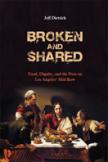The Worker's Tale
For over 40 years Jeff Dietrich has been a member of the Los Angeles Catholic Worker community, serving meals to the poor of the city’s Skid Row, writing for the community’s appropriately named newspaper, the Catholic Agitator, and doing jail time for various protests and acts of civil disobedience on behalf of justice, peace and the forgotten poor of our inner cities. More than 40 times he has been arrested. Broken and Shared is a powerful collection of essays written over those years.
In the introduction he tell us how he rediscovered his Catholic faith. To avoid induction into the military during the Vietnam War, he had fled to Europe; on his return he encountered some Catholic Worker members who offered him hospitality. They were, he says, people doing what Jesus would be doing, “feeding the hungry, clothing the naked, and burning draft files.” A light went on in his head that was to change his life.
Dietrich writes with a keen eye for detail and a sense of humor; the book is both passionate and personal. One chapter describes the Catholic Worker campaign to provide the city’s homeless with their own registered shopping carts, eventually totaling over 50,000. Several describe his prison experience, recounting to his wife Catherine Morris the constant threat of violence, his fear of rape and gratitude for a cup of coffee from a guard, even more precious for its acknowledgement of a shared humanity. Another describes the indignity of strip searches and the probing of his body cavities, the hours-long wait in the cold of a basement cell for his hearing, the intimidation of the court process.
Several chapters are on the church, the eternal conflict between the church institutional and the prophetic. Citing Dorothy Day, co-founder of the Catholic Worker, he argues movingly for fidelity to the church in spite of what he sees as its many sins and its “really orthodox” members who speak of the magisterium “as if the poor Holy Spirit has been locked in a tiny box in the basement of the Vatican, to be consulted only by the Pope during encyclical season.” And yet he still goes to Mass, unlike many of his fellow community members today, because the church gives us the faith, the Gospel and the Eucharist and is the church of Dorothy Day, Mother Teresa, the Berrigans, César Chávez, Oscar Romero and the many Catholics who support their community, and he wants to be in communion with them.
Most of the book is about the exploitation of the poor and vulnerable, a critique of “empire” with its military, religious and economic might, the “Arms Bazaar” that the Catholic Worker helped to drive out of Anaheim in 1980; the credit economy with its greed and competition, so different from the “Sabbath economics” of Leviticus 25, which calls for the cancelling of debts at seven year intervals; industrial agriculture, which that floods the environment with chemicals and leaves poor farmers unable to compete; the war on drugs that fills our prisons with the poor, largely African-Americans, supporting the “prison industrial complex”; technology that prizes production and power over peace; blood banks that purchase blood from the poor with insufficient remuneration and health care; the city’s Safer Cities Initiative, really a program to get the homeless off the streets; and the hugely expensive war in Iraq paid for by cuts in public health care, transportation and education, all of which affect the poor, while the wealthy receive tax breaks.
His vision is rooted in the Gospel story, in the counter-intuitive approach of Jesus, who condemned trying to cast out Satan by Satan’s demonic power, using instead the self-sacrificing power of the cross. Building his chapters around citations from Jacques Ellul, Walter Brueggemann, Ched Myers, René Girard, Noam Chomsky, William Stringfellow and Walter Wink, his social critique is wide-ranging.
The book is brutally honest. Dietrich acknowledges that his protest against the cardinal’s new cathedral has to do in part with his own unresolved issues with authority. He does not romanticize the poor; they are “not nice,” stealing batteries from the Workers’ cars and goldfish from their dining-garden pond. He personalizes them, giving them names—Cheryl, the inveterate crack addict with H.I.V.; Ron, who threatens the Workers with an empty wine bottle; Mean Ed, a passionate despiser of white people; the angry Wheelchair Bob—and yet he finds always the humanity within them.
Much as I enjoyed reading this book, I found it deeply disturbing, entering into my prayer, challenging my own certitudes. Many will disagree with the Catholic Worker’s anarchist approach to contemporary society. But it is deeply Catholic, rooted in the Gospel, centered on the works of mercy and the eucharistic meal, calling all Christians not just to worship Jesus but, in Dietrich’s words, to practice him.
This article also appeared in print, under the headline “The Worker's Tale,” in the April 16, 2012, issue.








